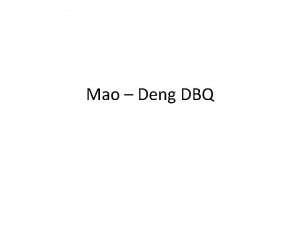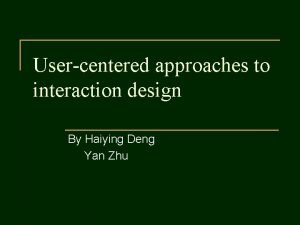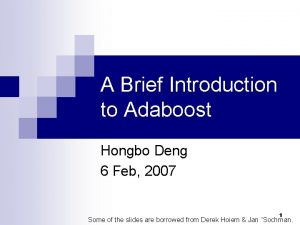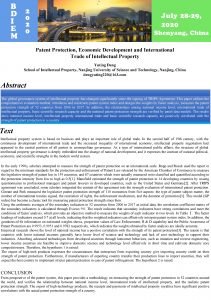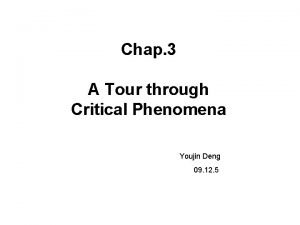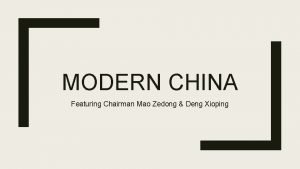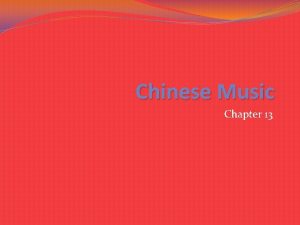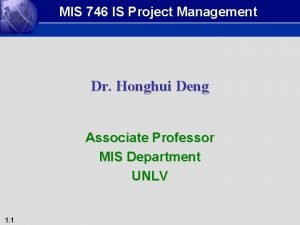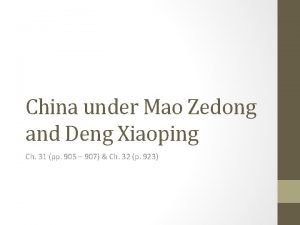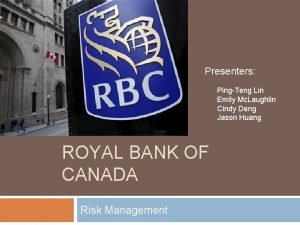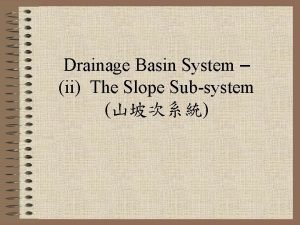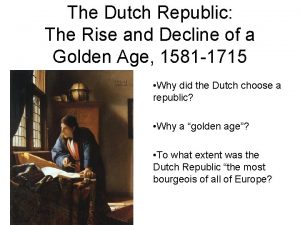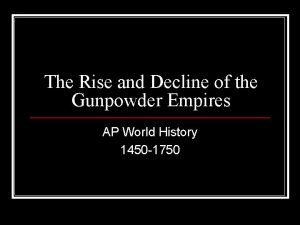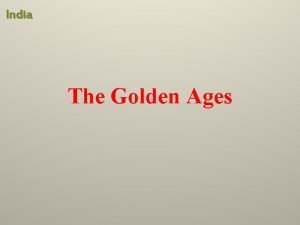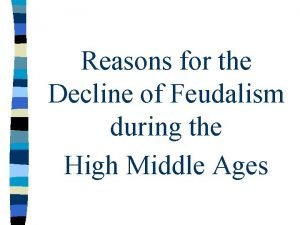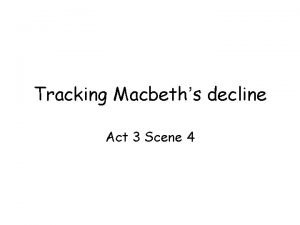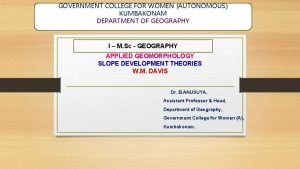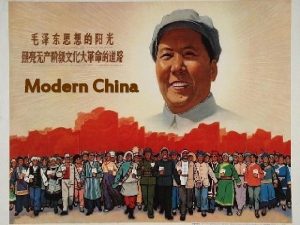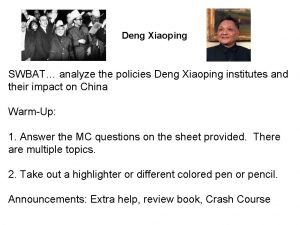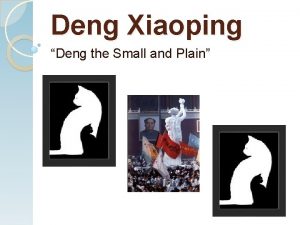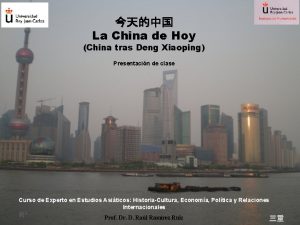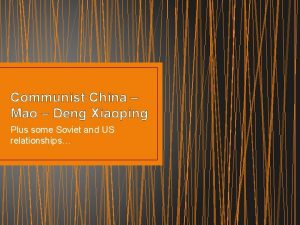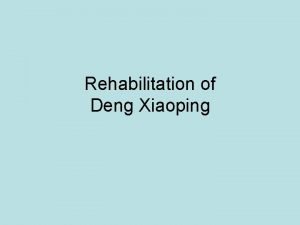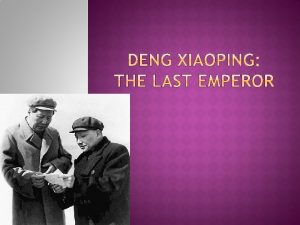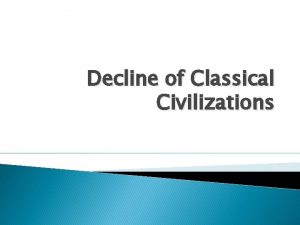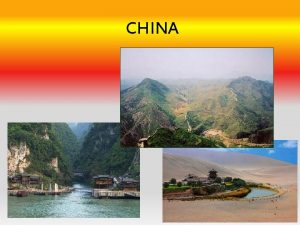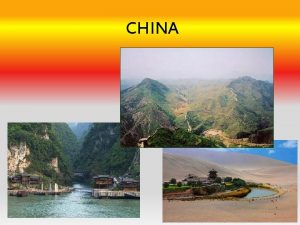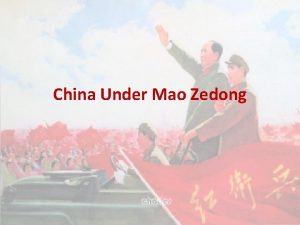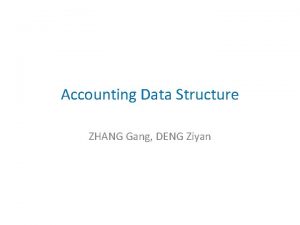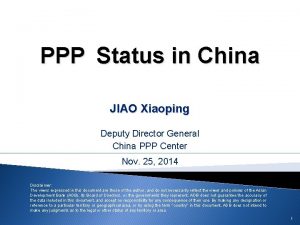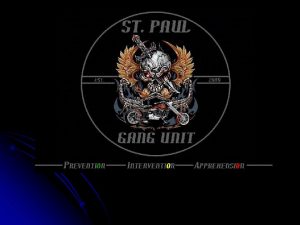China Under Deng Xiaoping Decline of Gang of





















- Slides: 21

China Under Deng Xiaoping

Decline of Gang of Four § The largest political rivals to the pragmatists Zhou Enlai and Deng Xiaoping § Headed by Mao’s wife and 3 contemporaries who held positions of power (literary critic, rumored next premier, and political theorist) § Hua Guofeng had replaced Zhou as premier after Zhou’s death – he was classified as a centrist – and eventually replaces Mao as chairman

Hua Guofeng § Politburo gives Hua three tasks: § Replace Mao § Rehabilitate Deng § Bring modernization § 10 th Central Committee – Gang of Four condemned, Hua officially recognized as Chairman and Premier (Prime Minister), and Deng given back his old positions § Deng is put in charge of the 4 modernizations (we will come to this later)

Hua, Mao, and the ‘Whatevers’ § Official declaration that the Cultural Revolution is over § “Demystification” of Mao – how do we preserve Mao’s image while addressing obvious shortcomings? § What’s the difference between Khrushchev and Hua? How was this process easier for Khrushchev? § June 1981 Sixth Plenum 11 th Central Committee – Mao was 70% right, 30% wrong – mistakes were made during cultural revolution; drafted by Deng (Hua had lost most power by now)

Hua, Mao, and the ‘Whatevers’ § Hua ‘s Two Whatevers campgain and the failure of the 10 year plan initiate his downfall § Two Whatevers – criticizes the gang for upholding whatever policy Mao made and following whatever instructions he gave. § Deng and other rightists begin criticizing Hua (ideology is important, but evidence from practice should guide) openly at the 3 rd Plenum 11 th Central Committee § Sept. 1980 Hua forced to resign as premier – Zhao Ziyang becomes premier (Deng placed him in Politburo in Jan. ), April 1981 Hu Yaobang (supporter of Deng) becomes general secretary. June 1981 Hua resigns as party chairman and chair of Military Commission. § Deng now officially the “paramount leader”

Economic Policies of Hua –’ 76 -85 (4 modernizations) § Agriculture, industry, science and technology, and military. § Deng, using pragmatism and lessons from previous failures, would attempt to modernize China. § This includes opening of relations and trade with the West § Agriculture: family plots restored and increased, subsidies increased § Industry: 10% wage increase for all, purchasing of foreign modern technology, wage differentials and specialization § 10 Year Plan – 1976 -1985 – relaxation on small enterprises, 120 industrial projects, Steel from 21 million tons 1973 to 60 million tons 1985, 180 million 1999.

Deng’s rise § Black/white cat– “It doesn’t matter if a cat is black or white, as long as it catches mice. ” § Market mechanisms – much like Hungary and Yugoslavia, China would seek to decentralize the economy without giving away overarching authority § Deng’s 1979 reorganization of the 4 modernizations – puts many projects on hold and focuses only on agriculture, light industry, and consumer goods § Allows incentives/bonuses, farmers can grow surplus for profit (sale to state), and opening of small enterprises (29% privately owned by 1996)

Agriculture under Deng § 1978 plans: Near 80% of China’s population was based in rural, traditional farming methods § Deng wished for smaller plots, more freedom, and more modern techniques to open the population to industrial jobs – Central gov’t still set targets of growth § 85% of agriculture would be mechanized, use of fertilizer and better irrigation stressed § Household Responsibility System (HRS) small commune plots could be rented and used as wished

Agriculture under Deng § Xiang – new agricultural base. Families and individuals would submit shares to local quotas. Once filled, surplus could be sold for private profit § Xiangs allowed any type of crop and family control over labor § 1980 – 15% of land would be set aside for this purpose § By 1983, 90% of households participated – much like NEP’s “enrich yourself” campaign – the policy was designed to make peasants rich

Industry under Deng § Two major phases to accomplish catching up with capitalist nations in industry § More difficult because industrial workers had the benefits of job security, good wages, subsidized housing, medical care, and pensions § Phase 1 1978 -1984 § Phase 2 Oct. 1984 § Zhao Ziyang placed in charge of overseeing these policies

Industry under Deng: Phase 1 § Similar methods to agriculture § Factories given more responsibility: setting wages, prices, and producing goods § Surplus above quota sold for a profit § Industrial Responsibility System – supervisory body for State Owned Enterprises (SOE) – contracts for production and profits – some to state, some kept § China opens its doors! Between 1971 -1974 foreign trade increased 300%. Under Deng 1978 -88 it rose 400%, another 400% from 8894. § Foreign investment and business must include 50% Chinese ownership, ensuring continuing Chinese control over the economy

Special Economic Zones § 1979 – More capitalist friendly zones § 15% tax waived first 2 years § No import duties on production materials or equipment § Non-residents needed special permission to move there – to avoid Capitalist influence spreading § Guangdong and Fuijian provinces were the first

Criticizing Deng § “Capitalist Roader!” § He responds by resigning his positions (remember, he put his allies in positions of power previously) § Deng felt that class division was gone, that China must advance in production to move to advanced socialism § By bringing in wealth, the country could address social inequities § Similar to the Lenin’s NEP and Stalin’s Stakhanovite movements through incentives, Marx – “socialism can only emerge in advanced capitalist nations” § Zhou Ziyang moves forward with Phase 2

Industry Phase 2 § Further reduction of control by the state § 55% state tax reduced to 33% - ’ 83 § Unprofitable enterprises could be closed § 7 th 5 Year Plan § More autonomy to state enterprises § Smash the “iron rice bowl” – longlasting high standards of living for industrial workers (introduce fear of unemployment) § Allow prices of goods to be determined by market forces

Deng’s Political approach § Democracy Wall 76 -80: Xidan Street near Forbidden City a wall is filled with “big character” posters, letters, and poems. § Initial toleration as they attack gang of four and Mao, Deng was appreciative. § As the movement widened and called on more democratic based reforms (including calls to Carter) to condemn human rights abuse, Deng clamped down

Call for Fifth Modernization § Wei Jingsheng – published a prodemocracy pamphlet during Democracy Wall time § Calls for the Fifth Modernization”which was democracy § Dec. 5, 1978 placed a big character poster calling for Fifth Modernization § March 29, 1979 Wei is arrested and imprisoned until 1993. Arrested again for subversion

Deng’s Response to Wei § Four Cardinal Principles: Socialist Road, Dictatorship of the Proletariat, Leadership of Communist Party, Marxism. Leninism and Mao Zedong Thought § Dec. 1979 – closes the Democracy Wall § 1980 Banning of the Four Big Rights – daming (speak out freely), dafang (air views fully), dabianlum (holding debates), dazibao (writing big character posters)

Reforming the CCP § 1982 movement to reorganize party by having old members retire § 60% below Politburo were now young and had college experience § Hu Yaobang (general secretary) and Zhao Ziyang (premier)- two members of CCP placed in power by Deng; both favored democratic policies toward dissent § Deng believed in stable political structure for economic success to work

Tiananmen Square § Democracy Salons – informal lectures held by intellectuals who were overtly politically progressive. § Called for release of political prisoners, opening of democratic ideals, etc. § April 15, 1989 Hu dies. “Mourning the dead to criticize the living” § Rallies and speeches call for freedoms to be opened § April 27 – after Deng denounces the groups, 100, 000 move toward Tiananmen Square

Tiananmen Square May-June 1989 § May 14 – hunger strike (Why is THIS a defining moment? Think of the Great Leap Forward) § May 15 Gorbachev visits – perestroika and glasnost § International TV crews and journalists there to cover the visit spend free time interviewing students § May 18 Li Peng holds tv interview with student leaders § May 19 – Zhao apologizes to students, feels they are justified § May 19 evening – Li Peng (premier) – martial law

Repression and Reactions § May 29 – 200, 000 troops move on Beijing § Thousands arrested § Hundreds killed after some try to fight back § June 4 – reported all major uprisings put down and demonstrations over § June 9 – a “counter-revolutionary rebellion” was suppressed § World continues as usual, as the new economic freedom is juuuust fine by them
 Mao zedong vs deng xiaoping
Mao zedong vs deng xiaoping Haiying deng
Haiying deng Hongbo deng
Hongbo deng Yuting deng
Yuting deng Youjin chap 1
Youjin chap 1 Deng xioping
Deng xioping Tianjie deng
Tianjie deng Haiqiong deng
Haiqiong deng Honghui deng
Honghui deng Deng
Deng Cindy deng
Cindy deng Yingying deng
Yingying deng Cindy deng
Cindy deng How was china reunited under the sui dynasty
How was china reunited under the sui dynasty The difference between slope decline and slope retreat
The difference between slope decline and slope retreat Baruch spinozza
Baruch spinozza Decline of the gunpowder empires
Decline of the gunpowder empires Sea otter population decline
Sea otter population decline Why mauryan empire decline
Why mauryan empire decline Reason for the decline of feudalism
Reason for the decline of feudalism Macbeth's moral decline
Macbeth's moral decline Davis slope decline theory
Davis slope decline theory
